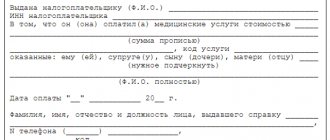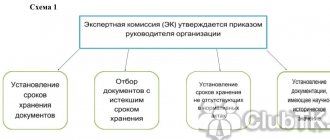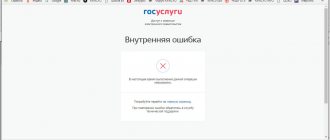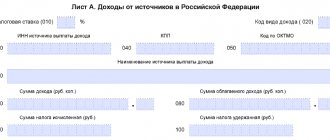A desk audit is carried out by tax authorities and allows for an analysis of the reliability of reports and the accuracy of their completion by taxpayers. This difficult step is necessary to obtain a tax deduction. During the process, the tax inspector registers and analyzes reports and documents of citizens; the correctness and accuracy of their completion affects the possibility of providing funds.
A desk tax audit takes place according to the rules, they are regulated by law. The article contains tips on how to view the progress of a desk audit in a taxpayer’s personal account, and find out what status it has been assigned and the results.
Tracking the progress of the tax return verification on the Federal Tax Service website in your personal account. Viewing information on the Federal Tax Service portal is impossible for those who have not received a password to log into the system. Anyone who has authorization data from their personal account will be able to log in and find out the status of personal income tax check 3 in their personal account.
We will tell you further how to check the progress of the desk audit of 3 personal income tax. If a taxpayer needs to check online at what stage his declaration to the Federal Tax Service is at, then the information is available in the LC. Details are visible if you click on her number. When you click on the link, the following data will be presented:
- The number that the declaration was assigned during registration with the tax office or on the website.
- Day of registration of the declaration.
- At the bottom of the page there is a button that can be clicked to add additional documents.
This will be needed by someone who forgot something or received a call from the tax office asking to add it.
When passing a desk check, a message is sent to your personal account on the same day it is completed. Detailed data is also indicated there by clicking on the link of the check you are interested in:
- Tax authority and registration number.
- Dates of admission and registration, as well as the end of verification.
- Desk audit status: “registered”, “completed”, “in progress” and others.
- The amount of tax deduction, which must coincide with that specified in 3-NDFL.
When the Federal Tax Service can send a request for the submission of documents
As part of desk and on-site inspections
According to the article of the Tax Code of the Russian Federation, the inspectorate has the right to request documents from the taxpayer during desk and field tax audits.
As part of a desk audit, the Federal Tax Service may include in the request not any documents, but only those mentioned in the article of the Tax Code of the Russian Federation. These include, in particular:
when applying tax benefits - documents confirming these benefits (clause 6 of Art. Tax Code of the Russian Federation); when submitting a declaration in which the right to a VAT refund is declared, - documents confirming the right to deductions for value added tax (clause 8 of Article of the Tax Code of the Russian Federation);
Carry out automatic reconciliation of invoices with counterparties
- if contradictions are detected between the data specified in the VAT return and in the reporting of counterparties, or in different fields of the same VAT return, or in the VAT return and in the log of received and issued invoices, - invoices, “primary” and other documents related to conflicting information (clause 8.1 of Art. Tax Code of the Russian Federation); - when submitting an updated declaration two years after the deadline for submitting reports, if the “update” states a decrease in tax payable or an increase in loss compared to the indicators in the primary declaration, - documents confirming changes in the initial data, and tax accounting registers where the indicators are reflected before and after changes (clause 8.3 of Art. Tax Code of the Russian Federation); - when submitting calculations for insurance premiums - documents confirming the validity of the reflection of non-taxable amounts and the application of reduced tariffs (clause 8.6 of Article of the Tax Code of the Russian Federation).
In addition, during the “camera meeting,” tax officials have the right to request additional documents in the following cases: when checking a declaration filed by a participant in a simple partnership; upon presentation of excise tax deductions; when a foreign company provides services on the territory of the Russian Federation, etc.
As part of an on-site audit, inspectors may request any documents related to the calculation and payment of taxes. The main thing is that such documents relate to the period being audited and the tax being audited. This follows from paragraph 12 of Article of the Tax Code of the Russian Federation.
Determine the likelihood of an on-site tax audit and receive recommendations on the tax burden
As part of the counter check
Employees of the Federal Tax Service can also request documents not from the taxpayer being inspected, but from his counterparties (including second, third and subsequent links) or other persons who have the necessary information. In addition, tax authorities may request documents outside the scope of the audit if they are collecting data on a particular transaction. Under these circumstances, the inspectorate employee who checks the taxpayer or collects data on the transaction sends a special order to the Federal Tax Service, where the counterparty or other person who has the necessary information is registered. Based on this instruction, a request for the submission of documents (information) is formed and sent to the specified person. This procedure is enshrined in Article 93.1 of the Tax Code of the Russian Federation.
We would like to add that the list of documents that inspectors can request during a counter inspection is not limited. Therefore, tax authorities have the right to request any papers - the main thing is that they relate to the activities of the taxpayer being audited.
Check the counterparty for signs of a shell company and the presence of disqualified persons
In what form does the inspectorate send requirements?
Paragraph 4 of Article of the Tax Code of the Russian Federation enshrines the following rule. If a taxpayer must submit tax reports in electronic form, then requests for the submission of documents are also sent to him in electronic form.
Such a taxpayer, in turn, is obliged to ensure the technical ability to accept electronic documents from tax authorities via telecommunications channels through an electronic document management operator. To do this, you need to enter into an agreement with the EDF operator and obtain a qualified certificate for the electronic signature verification key. This must be done within 10 days from the moment the taxpayer becomes obligated to submit electronic reports (Clause 5.1 of Article of the Tax Code of the Russian Federation).
Let us remind you that companies and entrepreneurs whose average number of employees exceeds 100 people must report taxes electronically. Also, electronic reporting is mandatory for all value added tax payers without exception and those who are tax agents for VAT or simply issue invoices to clients (for more details, see “Electronic reporting: who is required to report to regulatory authorities via the Internet”). This means that in practice, many organizations and individual entrepreneurs must receive requirements from tax authorities electronically.
Submit tax reports for free and respond to the requirements of the Federal Tax Service via the Internet
Please note that electronic correspondence with the Federal Tax Service Inspectorate can be handled by his authorized representative instead of the taxpayer. In this case, an additional document must be sent to the inspectorate confirming the right of the authorized representative to accept electronic demands and other documents addressed to the taxpayer from tax authorities (clause 5.1 of Art. Tax Code of the Russian Federation).
If the taxpayer has the right to submit tax reports on paper, then the Federal Tax Service can send him “paper” requests for the submission of documents. Accordingly, he is not obliged to provide the ability to receive electronic requests from tax authorities through an EDF operator.
In what form should the requested documents be sent?
There is no provision in the Tax Code that would oblige taxpayers receiving electronic demands to execute them only in electronic form. In other words, even if the Federal Tax Service sends requests for the submission of documents via the Internet, organizations and individual entrepreneurs, strictly speaking, can submit these documents in paper form. However, in real life almost no one does this. Typically, taxpayers who accept electronic claims send documents to inspectors electronically, because this method is more convenient, faster and more economical.
Electronic documents by format and paper documents
According to paragraph 2 of Article of the Tax Code of the Russian Federation, via the Internet you can submit either those documents that were originally compiled in electronic form in established formats (for example, invoices), or scanned images of paper documents.
There is a format for transferring scanned images, which is approved by order of the Federal Tax Service of Russia dated January 18, 2017 No. ММВ-7-6/ [email protected] The transfer is carried out via telecommunication channels through an EDF (electronic document management) operator, that is, through a system for sending reports . Sent documents must be signed with an enhanced qualified electronic signature of the person being verified or his representative.
Documents drawn up on paper can also be brought to the inspection in person, delivered through a representative, or sent by registered mail. Documents are submitted in the form of copies certified by the taxpayer. All sheets must be bound and numbered (see “Rules for the formation and submission of a binder of documents requested by the inspection are defined”). In this case, notarization is generally not required (Clause 2 of Article of the Tax Code of the Russian Federation).
"Unformatted" electronic documents
The Tax Code does not say how the requested documents should be submitted if they were originally drawn up in electronic form, but not in the established format (for example, contracts). Let us remind you that “non-format” documents signed with an electronic signature and transferred to the counterparty through an electronic document management system (for example, “Kontur.Diadoc”) are recognized as legally significant. From the letter of the Federal Tax Service of Russia dated 09.09.15 No. SA-4-7/15871 it follows that before sending a “non-format” electronic document to the inspection, it is necessary to print it out, certify it in the usual manner and make a note that it was signed with an electronic signature (see . “The Federal Tax Service explained how to submit electronic documents to the inspectorate, the formats for which are not approved”). You can probably proceed by analogy with sending paper documents. That is, either submit paper copies to the Federal Tax Service in person or by mail, or scan them and send the scans to the inspectorate through the system for sending reports.
Also see “How to sign an electronic “primary document” and how to delegate the right to sign it.”
When should documents be submitted?
If documents are requested as part of a desk or field audit, the taxpayer must submit them within 10 business days from the date of receipt of the request (20 business days when auditing a consolidated group of taxpayers). This is stated in paragraph 3 of Article of the Tax Code of the Russian Federation. If the Federal Tax Service Inspectorate has requested documents as part of a “counter” check, then 5 working days are allotted for submitting documents from the date of receipt of the request. If tax authorities have requested information on a specific transaction, it must be provided within 10 working days from the date of receipt of the request (clause 5 of Article 93.1 of the Tax Code of the Russian Federation).
What date is considered the day the request was received? The answer to this question depends on the form in which the demand was sent.
Request in electronic form
The date of receipt of the electronic request is considered the day when the taxpayer opened the file with this request and sent a receipt to the Federal Tax Service. This follows from paragraph 10 of the Procedure approved by order of the Federal Tax Service of Russia dated July 16, 2020 No. ED-7-2/ [email protected]
The taxpayer must submit a receipt for acceptance of the request to the Federal Tax Service through the EDF operator no later than six working days from the date the request was sent by the inspectorate (clause 5.1 of Article 2 of the Tax Code of the Russian Federation). The moment of dispatch is recorded in a document called “Dispatch Date Confirmation”. Such confirmation is generated by the EDF operator and sent to the tax authorities and the taxpayer (for more details, see “How to respond to electronic requests from the Federal Tax Service: step-by-step instructions”).
Receive requests from the Federal Tax Service for free and send the requested documents via the Internet
Requirement on paper
The date of receipt of a request sent by registered mail is considered to be the sixth day from the date of sending the specified letter. This rule is enshrined in paragraph 4 of Article of the Tax Code of the Russian Federation.
What to do if the taxpayer does not meet the deadlines
It is possible that the organization or entrepreneur does not have time to prepare documents within the deadline specified in the requirement. Then you need to send a written notification to the inspection about the impossibility of submitting documents (information) within the prescribed period (the form and electronic format of the notification was approved by order of the Federal Tax Service of Russia dated April 24, 2019 No. ММВ-7-2/ [email protected] ). Such notification must be submitted to the Federal Tax Service within the day following the day the request was received. This can be done in person, through a representative, or electronically. And persons not required to report electronically may send notice by mail.
Having received the notification, tax authorities must make a decision within two days: to extend the deadline for submitting the requested documents or to refuse the extension. Please note that the Tax Code does not limit tax authorities on the question of how long to extend the deadline for submitting documents. Therefore, this period can be any. The only restriction has been introduced for consolidated groups of taxpayers - for them, the deadline for submitting documents can be extended by at least 10 days (Clause 3 of Article of the Tax Code of the Russian Federation).
Liquidation and reorganization
Separately, it is worth going through the procedures for liquidation and reorganization of a company.
Art. 20 of the Law specifies a 3-day period for filing a notice of the commencement of liquidation. Further in the procedure there are no clear deadlines for submitting documents. Further deadlines are based on publication in the Bulletin and completion of procedures for the sale of property and satisfaction of creditors’ claims.
Art. 13.1 also indicates a three-day deadline for submitting documents to begin the reorganization procedure. Further, the deadline is based on publications in the Bulletin.
4.5 / 5 ( 11 votes)
How to quickly send a large number of documents to the Federal Tax Service
Often the number of documents specified in the requirement amounts to tens, hundreds and even thousands. It takes a lot of time and effort to prepare and send such an impressive package to the inspection. And even if the Federal Tax Service extends the deadline for submitting documents, it can be difficult to meet it.
In this regard, many companies and entrepreneurs use modern services that make it easier and faster to send documents to the inspectorate. Such services, in particular, include “Connector Kontur.Extern”. It makes it possible to send tens of thousands of electronic documents to tax authorities at a time, while approximately 9 thousand documents are processed per hour.
Through the “Connector” you can transfer to the Federal Tax Service any electronic documents created in approved formats (for example, invoices, TORG-12 invoices, etc.). Such documents are sent in the form of XML files. Also, “Connector” sends scanned images of any documents created on paper: acts, contracts, bills, etc. Scanned images are transmitted in the following formats: pdf, jpg, png, tiff. An inventory of sent documents is generated automatically.
Taxpayers who have to submit a lot of “primary information” to the Federal Tax Service proceed as follows. They install the “Kontur.Extern Connector” on different computers and start parallel sending. Thus, the risk of missing the deadlines for submitting documents is reduced to zero.
Connect to the Kontur.Extern system
How have the general requirements for document preparation changed?
Several changes can be highlighted. Thus, the new requirements do not contain a ban on double-sided printing of applications and related documents. You cannot specify the size of fractions as a decimal fraction (for example, 0.5). The appropriate format is as a percentage or as a simple fraction (for example, 1/2).
Phone numbers will need to be entered without parentheses. If the number is Russian, it should be given with the code “7”, and not with the code “8”, as now.
It is recommended that the charter be drawn up as follows:
- indent on the left edge - 3 cm;
- free upper left corner of the first page measuring 8x8 cm.
What to do if you don’t have the necessary documents
It happens that the inspectorate requests documents that the taxpayer or his counterparty does not have, and perhaps never had. What to do in such a situation?
The taxpayer has the legal right to refuse. Paragraph 3 of Article of the Tax Code of the Russian Federation states that the person to whom the demand is sent may, within one day from the date of its receipt, inform the tax authorities that he does not have the necessary documents. A similar rule is contained in paragraph 5 of Article 93.1 of the Tax Code of the Russian Federation. The form and format of the notification were approved by order of the Federal Tax Service of Russia dated April 24, 2019 No. ММВ-7-2/ [email protected]
Is it possible to refuse an answer altogether and ignore the request?
No, in general it is impossible to refuse to respond to a request for documents or a call to the Federal Tax Service.
Always respond to inspectors' requests
, even if they are interested in information or documents on an organization or individual entrepreneur that you have never heard of and which are definitely not your counterparties.
In this case, send a refusal to the tax office using a special form. To do this, fill out the second block of the notification about the absence of the requested documents from the Federal Tax Service order No. ММВ-7-2/ [email protected] It must indicate that you do not have the requested documents
or information due to the fact that you do not cooperate with the specified counterparty and have never concluded any transactions.
What to do if documents are requested again
The Federal Tax Service has the right to request documents again, and the taxpayer, in turn, has the right not to submit papers that were previously submitted. In this case, the taxpayer needs to notify the inspectorate that these documents have already been submitted. The notification should indicate the details of the document with which the requested contracts, invoices and invoices were submitted or to which they were attached, and the name of the inspection that received it. This must be done within the deadlines designated for submitting the requested documents.
This rule does not apply to original documents submitted by the taxpayer and received back by him, as well as to documents lost by tax authorities “due to force majeure circumstances.” Such papers must be submitted a second time.
How the focus of tax audits has changed
Initially, the focus of inspections was aimed at combating fly-by-night companies. Tax officials tried to identify companies that were created for a short period of time and did not set a goal to carry out real economic activity. It was on them that the tax office developed its approach to checking the counterparty.
Development of tax service approaches to checking counterparties
In many ways, the tax authorities were helped by the launch of the ASK VAT-2 system. It made it possible to identify situations online when the budget did not create a source for reimbursement of funds claimed for deduction.
Letters from the department began to appear that revealed the internal approaches of the tax service to checking counterparties. In particular, a so-called risk-based approach was developed, according to which all taxpayers are distributed into a number of groups and a risk factor is assigned to each of them. Depending on this factor, the degree of tax control is determined.
Requirements for choosing a supplier not only of the first level
From a certain point to this day, tax authorities have raised questions about due diligence in choosing a supplier not only of the first, but also of previous levels.
As judicial practice has shown, it is no longer enough to simply demonstrate to the tax authorities formal compliance with the due diligence criteria, for example, by collecting a set of basic documents indicating that the counterparty exists.
Tax authorities began to understand the details. They were interested in how much you, when choosing this or that counterparty, this or that business model or supply chain, understand that you are dealing with a conscientious partner who meets not only your commercial interests, but also the interests of the state.
Tax authorities want business representatives to know their counterparty in some detail. It is important for them that taxpayers themselves make some effort and understand:
- does the counterparty have enough expertise;
- whether he has the funds or resources to implement the business project;
- how long the company has existed and whether it is able to fulfill the order in principle.
Essentially, the tax authorities want to share the burden of conducting control procedures with the taxpayers themselves.
What sanctions are provided for violators?
Taxpayers who are required to report to the Federal Tax Service in electronic form, but have not ensured the opportunity to receive electronic documents from the inspectorate, will have their bank accounts blocked by the tax authorities. The same thing will happen if this taxpayer does not send a receipt to the tax authorities for receiving an electronic demand (subclause 1.1 and subclause 2 of clause 3 of Article 3 of the Tax Code of the Russian Federation; for more details, see “Failure by a taxpayer to submit an electronic receipt of receipt of documents from the inspection is grounds for blocking the account ").
Receive requests from the Federal Tax Service for free and send the requested documents via the Internet
For failure to submit on time the documents requested as part of the audit (which, according to the inspectors, the taxpayer has), a fine is provided on the basis of paragraph 1 of Article 126 of the Tax Code of the Russian Federation. Its amount is 200 rubles for each document not submitted. If the counterparty of the inspected taxpayer refused to send the documents requested from him about this taxpayer (despite the fact that such documents are available), the inspectors will issue a fine under paragraph 2 of Article 126 of the Tax Code of the Russian Federation in the amount of 10,000 rubles. An unjustified refusal to provide information about a specific transaction entails a fine of 5,000 rubles under clause 1 of Article 129.1 of the Tax Code of the Russian Federation, and for a repeated refusal within a year the fine will be 20,000 rubles (clause 2 of Article 129.1 of the Tax Code of the Russian Federation).
What should be the business response to the demands of the tax authorities?
Today, many taxpayers still limit their counterparty due diligence procedures to the collection of basic information that is available in open sources.
For example, there is a whole set of free resources of the Federal Tax Service for searching for a counterparty by TIN, checking tax arrears, identifying mass registration addresses, searching for people in the register of disqualified persons, etc. Also, the “Transparent Business” service has been operating for several years now, with which you can obtain comprehensive information about the taxpayer. As part of this resource, the Federal Tax Service is opening more and more useful data that can be used to minimize risks.
But, unfortunately, using only open sources to verify a counterparty is not enough today.
All data about the counterparty in one click: search for related organizations, participation in government contracts, financial condition and much more
Submit a request for a demo
It is important that companies' approach to vetting their business partners is based on:
- on legal requirements;
- in judicial practice;
- on the regulator's explanations.
Today, a reasonable approach is to build a certain system of measures, which should include not only the collection and analysis of publicly available information, but also evidence that the business partner has sufficient resources, has qualified employees, etc.
As part of the analysis, a number of questions need to be answered. Does your counterparty involve other counterparties to perform its task? Are you aware of the entire supply chain? Does the counterparty pay taxes and what documents can you confirm this without violating trade secrets?






